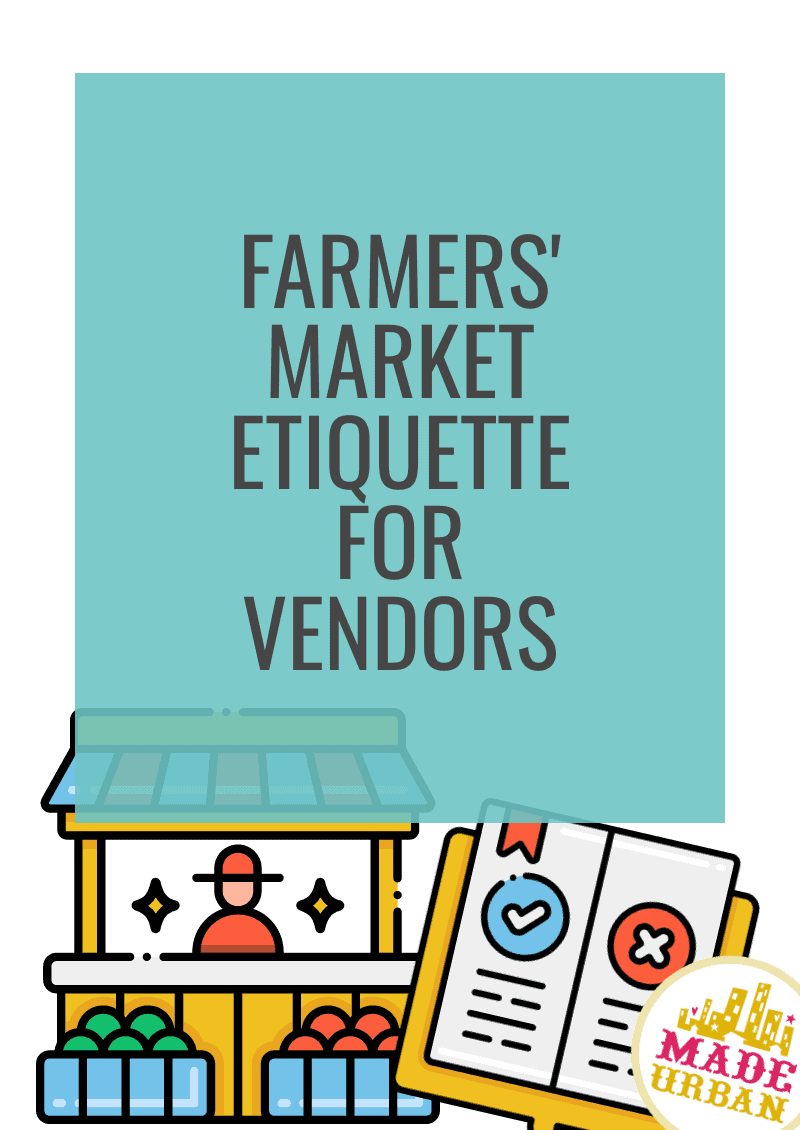Farmers’ Market Etiquette for Vendors
Farmers’ markets have a unique selling and shopping atmosphere. If you’ve never sold at one, you may be unaware of the unwritten rules the organizer, fellow vendors, and shoppers may expect you to follow.
Each market will have its own set of rules to follow so be sure you read over the applications carefully.
In general, here are some common practices:
1) Show up rain or shine
Markets generally run rain, snow, or shine and will only shut down in the case of extreme weather. Not showing up to a market you’ve booked because it’s raining will likely upset the organizer as they now have an empty space to fill. If it is raining or snowing and the organizer hasn’t cancelled the event, dress appropriately so you also show up with the right attitude for the day.
2) Be courteous of other vendors when unloading
Booth spaces are often larger at outdoor markets and everyone has big items to unpack and haul to their space (tent, tables, etc.). Due to the size of many outdoor markets, you’ll most likely need to back your car directly to your space to unload and if that is the case, be sure you quickly unload and move your car so others have the space to do the same.
3) Follow set up and selling times
As with any other show, be on time and have your booth set up by the time the market opens. Most outdoor markets won’t have gates to keep the public away until opening time, however, you’re typically expected not to start selling until that time, even if someone pops by your tent. If one person begins shopping 20 minutes early, soon more people will follow.
4) Don’t pack up early
The weather may be rainy or you may have sold out but market organizers don’t want empty spaces that were previously filled. Stay until the market closes so you don’t cause a commotion for vendors still trying to sell. If you’ve sold out of product, use it as an opportunity to market your business. Have a sign ready for this occasion, which states you’re out of stock for the day and where people can find you after the market.
5) Weigh your tent down
Markets will generally have rules for how much weight you need to hold your tent down. But even if there isn’t someone walking around and checking, make sure your tent and products will stay put in the case of some wind. Other vendors, shoppers, and organizers don’t want to worry about flying objects and someone getting hurt.
6) Don’t spill out of your allotted space
There’s usually a lot more room for roaming when you’re at an outdoor farmers’ market, but that doesn’t mean you can spill into the aisles. Vendors are expected to keep their products and displays within their booth space (which is usually 10 x 10). Just think how narrow the pathways would get if every vendor took an extra foot or two.
7) Don’t assume you’ll get the same spot every time
If you’re applying to be a returning vendor at a Farmers’ Market, it’s always ideal to be in the same spot so customers know where to find you. However, that’s not always possible. Market organizers need to arrange vendors based on who is selling that day and how many vendors there are. If you get displaced from your usual spot, don’t get upset. Announce through your social media where shoppers can find you this week and go with the flow.
8) Make sure you’re following food regulations
There are certain regulations you need to follow when it comes to the preparation, storage, and sale of food products. Market organizers do not want shoppers getting sick due to contamination or getting in trouble with the health inspector. The rules may vary depending on where you live and which market you’re participating in so be sure you have all your ducks in a row before market day. You may also be required to show proper documentation that you are indeed qualified to sell your food products and they are what they claim to be (e.g. certified organic). As well as proof of liability insurance if the market doesn’t cover that under their own insurance.
*Make sure your business is following all the laws it’s required to. Check out LAWS FOR SELLING HANDMADE.
9) Don’t spring new products on the market
Farmers’ markets generally need to approve each item you plan on selling. So don’t show up with a different line of products than you applied with. If your application stated you’d be selling baked goods, don’t add a section of vegetables to your booth.
10) Clean up after yourself
Organizers can’t supply enough garbage cans to hold every vendor’s trash so be sure you have garbage bags to clean as you go and keep your space tidy. When the market is over, the space goes back to being public streets and sidewalks and if they’re not clean, organizers could be fined by the city. So be sure you leave your space as you found it.
If you sell at farmers’ markets, please add any additional etiquette rules in the comment section.


Hey, I’m Erin 🙂 I write about small business and craft show techniques I’ve learned from being a small business owner for almost 2 decades, selling at dozens of craft shows, and earning a diploma in Visual Communication Design. I hope you find my advice helpful!

I really appreciated this blog. I do a lot of farmer”s markets and this information is very helpful.
I think number one should be unload and move your vehicle…the only time it is acceptable to set up your tent first is when it is raining so you can put your product underneath while you move your vehicle!